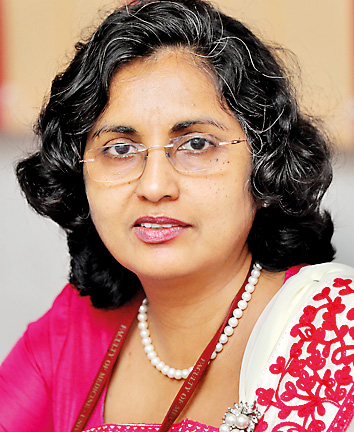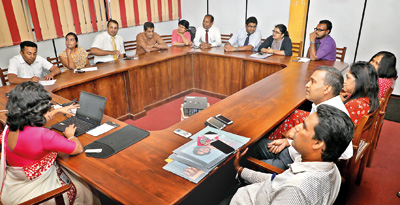News
Taking forensic medicine to greater heights
The response was immediate and voluntary. The moment they heard of the Easter Sunday bomb blasts, with Katuwapitiya being one of the worst hit, the forensic medical specialists rallied round, offering their services to the Negombo Judicial Medical Officer (JMO).

Prof. Anuruddhi Edirisinghe
One was there about 45 minutes after the bomb blast, with many more following quickly to the site of this man-made devastation. Rushing to Katuwapitiya from Negombo, Ragama, Gampaha, Chilaw and Kurunegala areas, the ‘role’ of these forensic medical specialists was as ‘Crime Scene Investigators’.
Nearly four months after, as the College of Forensic Pathologists of Sri Lanka (CFPSL) prepares to induct its new President Prof. Anuruddhi Edirisinghe next Friday (August 16) at the Galle Face Hotel in Colombo, there is a look back before plans for the future are fine-tuned.
It is after the ‘looking back, looking forward’ meeting this Monday that the Sunday Times sits down with them to hear their future plans.
Before detailing her theme for the next year, ‘Strategic pre-planning for a quality-assured forensic service in Sri Lanka’, Prof. Edirisinghe who takes over as the CFPSL’s 16th and just the second female President gives the backdrop in which the CFPSL was formed nearly 20 years ago. Prof. Edirisinghe is currently Professor of Forensic Medicine, Faculty of Medicine, University of Kelaniya.
As Prof. Edirisinghe takes on the mantle of the CFPSL, there is a strong plea from her to take forensic medicine to greater heights by ensuring that quality assurance goes hand-in-hand with system improvements.
She turns her focus to the lessons learnt from Katuwapitiya. Sri Lanka having limped back to normalcy after the LTTE defeat in 2009, was sent into shock by the multiple bombings on April 21, this year.
“While the people remained numb, the armed forces, law enforcement services and forensic experts worked day and night to find answers amidst the rubble and heartbreak of this tragedy,” says Prof. Edirisinghe who volunteered to go to Katuwapitiya that day.
“I felt that if we were prepared more we could have done a better job comparable to any international standard. We had enough expertise, but what we lacked were the resources,” she reiterates, giving several examples.

Robust discussions – looking back and looking forward (from left) Dr. Prasanna Appuhamy, Dr. Vianney Dias, Dr. B.C.S. Perera, Dr. P.R. Ruwanpura, Prof. Indira Kitulwatte, Dr. Hadun P. Wijewardena (CFPSL’s Immediate Past President), Dr. T. Muthulingam, Dr. Yalini Thivaharan, Dr. B.N.T.M. Borukgama, Dr. Sangani Gangahawatte, Dr. D.A.H. Samadhi, Dr. W.R.A. Saminda Rajapaksha, Dr. Ajith Rathnaweera and Prof. Anuruddhi Edirisinghe. Pix by M.A. Pushpa Kumara
Day 1 – The need for a ‘box’ or ‘kit’ for each JMO or Scene of Crime Officer (SOCO) when faced with mass deaths, such as at the Katuwapitiya church. The box or kit should contain body bags, numbers, registers and measuring equipment etc.
She says that the polythene bag with which they were supposed to cover a body, was cut to 8 feet. When they covered the body and put a knot over the head area, the legs remained exposed. This compelled them to put another polythene bag to cover the legs. There were also no ‘body bags’ like in Colombo. When the body bags arrived from Colombo, 70 bodies had already been sent to the Negombo Hospital.
“I understand that some hospitals have Disaster Victim Identification (DVI) boxes or cupboards for the management of cases involving living people as well as the dead. However, I am not afraid or ashamed to say that neither the Ragama JMO’s Office and the Negombo JMO’s Office nor the SOCO teams who were at Katuwapitiya had such equipment,” she says.
Days 2 & 3 – When collecting the remaining body parts and personal effects, the SOCO vans did not have enough zip-lock bags for methodical collection of specimens.
The crime scene investigators had no protective gear. The church roof had been blown off and whenever the wind blew, the roof-tiles flew down like missiles. (Prof. Edirisinghe describes how a police officer offered her his traffic helmet on the first day and the police provided safety helmets on the second day.)
Better coordination among the relevant groups (medical, scientific and law enforcement) would have helped manage the crime scene better, especially in this man-made disaster.
To aggravate matters, in the midst of the forensic investigations, politicians with camera crews in tow descended on the crime scene, which should not be disturbed for fear of contamination.
Another hindrance was requests by the local politicians to hurry up the ‘crime scene investigation’, to begin rebuilding the church.
Looking back at the events of those days, Prof. Edirisinghe makes an urgent and powerful call that “we should be prepared for disasters rather than waiting for the disaster to hit us”. We should have plans for mobilization of nearby teams rather than waiting for volunteers.
It was at the annual general meeting of the CFPSL on May 30, that its membership unanimously decided to work towards this goal. “We have drawn up a proposal with a budget and I hope the stakeholders will give us their support in our efforts to give dignity and justice to the dead,” is her fervent plea.
Moving onto ‘quality assurance’ in forensic medicine, Prof. Edirisinghe says that it is a workable concept. It needs to come from within, rather than outsiders imposing it on them. Over the years, the CFPSL has developed many guidelines and there is a need to evaluate whether they are being followed, if not why and then redress the situation.
She urges that other aspects that should be looked into and strengthened are documentation, report writing, sending reports to courts and giving evidence in courts. Medico-legal documents should be safeguarded in a confidential manner, but every four years the JMOs go on transfer. This is the challenge – should they carry their reports to the next station? What happens when they retire – should they take them home because according to the Manual of Hospital Management of 1995 medico-legal documents should be kept for a minimum of 25 years? Many senior consultants have to build a separate room in their homes for these ‘document cupboards’ at their retirement.
“We, the CFPSL also need to focus on system failures such as long court delays which lead to issues of locating the doctors to serve summons due to many transfers and document-damage due to poor storage (the time has come to find alternative methods such as e-documents, saving in computers in a confidential manner and cyber space storage). We need standard operational procedures/or terms of references in our work,” reiterates Prof. Edirisinghe.
Quality assurance is another major area where the CFPSL is planning to start a dialogue – when a person dies, the socio-cultural practices are to take the body home as soon as possible for the funeral rites. Forensic pathologists are pressurized to quicken the autopsy, with the added burden of working with limited facilities.
All these things need to change, she adds.
| Impartial along with excellent reporting and management | |
| The aim of the CFPSL which will celebrate its 20th birthday on November 16, next year, the Sunday Times learns, is to achieve the highest standards in forensic medicine throughout Sri Lanka. The beginnings have been humble and Prof. Anuruddhi Edirisinghe who got into forensic medicine in 2000, recalls how at that time doctors, particularly women, were reluctant to enter this field. The CFPSL had been born when the country was in the throes of terrorism. Suicide bomb attacks, firearm deaths, deaths related to terrorism, allegations of torture as well as rising rates of child abuse were high on the list of daily work of forensic pathologists in addition to routine duties. So, who are forensic medicine specialists? They are medical specialists in forensic medicine, with about 40 working for the Health Ministry in major state hospitals across the country (they are the JMOs) and about 20 working for the Higher Education Ministry in the medical faculties. Their job has two prongs – ‘clinical forensic medicine’ which deals with the ‘living’ and involves examination of a victim or a perpetrator for medico-legal issues and ‘forensic pathology’ which deals with the ‘dead’. Under clinical forensic medicine falls cases of child abuse, sexual abuse, assault, road traffic accidents, alleged torture and more and under forensic pathology is unnatural deaths such as suicides, homicides, accidents and deaths where a reason or cause is not known. It is under the latter that postmortems are conducted by them. Prof. Edirisinghe points out that the CFPSL founded by President Dr. L.B.L. de Alwis with a membership of 20, has grown from strength to strength. It has proven not only to Sri Lanka but the world about the impartiality of forensic pathologists in crime investigation and excellent reporting and management even with minimum facilities. |

